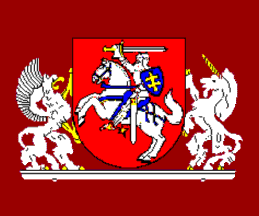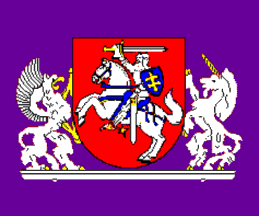 (5:6)
(5:6) image by Željko Heimer, 16 May 2002

Last modified: 2013-10-07 by zoltán horváth
Keywords: lithuania | presidential flag |
Links: FOTW homepage |
search |
disclaimer and copyright |
write us |
mirrors
 (5:6)
(5:6)
image by Željko Heimer, 16 May 2002
See also:
The presidential flag of Lithuania is dark or brick red with
the full state coat of arms in proper colors (shield plus
supporters and base). Proportions are, I believe, 2:3 and the
flag was adopted in 1989 or 1990.
Tom Gregg, 17 Febuary 1998
The flag of the President is to be found in the article 12 of the law n°I-56 on the Office of President adopted on the 26th of January 1993:
Article 12:
The President of the Republic shall have a flag which shall be the symbol of the head of the State.
The flag of the President of the Republic shall be made of purple cloth, on both sides of which the State Emblem of Lithuania shall be in the center, held by a griffin on the right and a unicorn on the left. The width to length ratio of the flag of the President of the Republic shall be 1:1,2.
The flag of the President of the Republic of Lithuania as well as pictures thereof must always correspond to the standard picture of the colors of the flag of the President of the Republic, which shall be approved by the Seimas of the Republic of Lithuania on the recommendation of the Heraldry Commitee of Lithuania.
The flag of the President of the Republic shall be flown over the residence of the President of the Republic when the President of the Republic is in Vilnius, or in the place where the President's summer residence is located.
The flag of the President of the Republic shall also be flown on ships or other vehicles, on or in which the President of the Republic is.
This flag was approved by the Seimas (Lithuanian parliament)
on the 18th of February 1993. The flag was raised for the first
time over the left wing of the parliament on the 25th February
when Algirdas Brazauskas was sworn as president. At that time
questions were raised whether the parliament should have been
concerned with the flag when other more important issues, such as
the budget for 1993 had not been settled.
Note: there isn't any Greater Coat of arms for Lithuania.
The State emblem, as it is called, with the two supporters appear
only on the Presidential flag. The law about the State emblems
describes only a "small" coat of arms.
Pascal Vagnat, 16 March 1998
I suspect it is the dark red version that is correct. I have
wondered about the proper colour for the field of the
presidential flag for some time. It is purple in Željko's
images below and purple is the term used to describe the colour
in English language descriptions of the flag, as for instance in
the translation of the legal text above. Now, as Antonio
previously explained concerning the flag of Chuvashia, we know
how difficult translations to purple can be. I suspect there is a
red/purple problem for the presidential flag of Lithuania too. In
the book Heraldry of Lithuania I [ris98]
for instance, the presidential flag is shown illustrated in a
drawing with a colour I can best describe as reddish brown or
brick red. Nevertheless, the caption to the drawing says the
field is purple and, to add to the confusion, in the text itself
the field is described as "a purple cloth approximating
red". Looking at photographs available from the president's
web site, however, it appears the drawing is correct about the
dark red colour of the field, see: <www.president.lt/tour/nbig1.jpg>
and <nbig3.jpg>.
In light of this, I would say there is a case for changing the
field colour to dark red.
Jan Oskar Engene, 16 May 2002
According to the photo at <story.news.yahoo.com>,
the flag is dark red and not purple.
Zach Harden, 28 Febuary 2003
Once again, there are misunderstandings of given colour names.
The law says the flag is of purple cloth. Please keep in mind
that only in Britain purple is violet. In central Europe purple
is "Purpur", which is a bright dark red. So the shown
purple (=violet) flag must be wrong. Tom Gregg writes the flag is
dark or brick red and does not explain where his "brick
red" comes from. In older terminology brick red (ziegelrot)
was a vermillion shade of red. All (or nearly all) German flags
up to 1933 were described as black, white and brick red. That
colour was named after red bricks and not after brown bricks...So
dark red would be clearly enough...
Ralf Stelter, 3 March 2003
From The Heraldry of Lithuania, Vol. 1, Vilnius 1998:
"The Flag of the President of the Republic of
Lithuania
Description - A purple cloth, with yellow cord edging on
three sides. The center of both front and back is charged with
the coat of arms of the State of Lithuania. The shield is
supported on the dexter side by a white griffin, on the sinister
side by the white unicorn standing on a white pedestal. The
griffin's beak and talons, and the unicorn's hooves and horn are
golden, their tongues red. The relationship of the width of the
flag to the length is 1:1.2. The staff is of natural wood and has
a spear-head imprinted with the coat of arms of the State of
Lithuania.
Overview - The majority of States incorporating the institution
of President use flags which represent said institution. In terms
of status the Presidential flag is second after the national
flag, or third if a State flag is used alongside the national
flag. Presidential flags are emblematic and often differ from
national and State flags in their colour, size, and
ornamentation. Lithuania did not previously have an officially
legalized Presidential flag, though there is evidence that one
was used in the pre-war Republic of Lithuania. At that time the
red flag bearing the mounted knight on one side and the Columns
of the Gediminas family on the other, was hoisted above the
Presidential Palace. This was a modification of the ancient
historical State flag, approved by the Council of Lithuania in
1918.
The symbolism of the new flag for the President of the Republic
of Lithuania was based on the historical State flag. However,
bearing in mind that a need may arise in the future to officially
legalize, alongside the national flag, a separate flag for the
State of Lithuania (the red one with a silver knight), it was
decided that a purple cloth approximating red should be used, and
that the State coat of arms should be embellished with shield
supporters on the Presidential flag. Supporters existed in
Lithuanian heraldry from the time of Vytautas until the end of
the 18th C. They included angels, warriors, various flora,
mythological beings and other creatures. The griffin and the
unicorn were chosen from a great many historical supporters for
several reasons. First of all, the previously favoured angels are
no longer used by secular States, and armoured warriors would
make the Presidential emblematic flag appear too militaristic.
Meanwhile the griffin and the unicorn are supporters for a great
many European State arms and carry deep symbolic meaning.
The griffin and the unicorn have been part of Lithuanian State
heraldry since the beginning of the 16th C. The griffin is a
hybrid of the eagle and the lion. It symbolizes the eagle's
vigilance and keen eye, and the lion's strength and pride. The
mythical unicorn is similar to a colt, but has cloven hooves, a
beard, and a golden spiralled horn growing out of its forehead,
wherein dwells its intellect. It is a symbol of wisdom,
tolerance, and innocence. In the past, both mythological beings
were used not only in heraldry, but also in church life, and were
favoured by astrologers and alchemists. During the 14th - 16th
C., the unicorn, representing chastity, was a symbol of the
Blessed Virgin Mary, and the griffin was often connected with
Christ. The eagle is a heavenly being, and the lion an earthly
one, as Christ is the embodiment of both divine and human
elements.
The main principles of the composition of the Presidential flag,
as put forward by the Lithuanian Heraldry Commission, were
confirmed by the Parliament of the Republic of Lithuania on
January 26 1993, at the passing of the Law for the President of
the Republic of Lithuania, and the colour standard for the flag
was confirmed on February 18.
Audrius Slapsinskas, 24 June 2003
A slightly different
Lithuanian presidential flag is shown on the website of the Lithuanian
Embassy in Canada.
Valentin Poposki, 4 January 2006
In all descriptions of Lithuanian arms and flags the word
"purpure" is used for the colour that is (for my eye)
closer to "sanguine" of Western heraldry. I don't know
the reason but just transfer the meaning of official the
descriptions.
Most likely, this is a cultural difference: the Western
"purple" is called "violet" here, and
"purpure" means "dark red".
If this is not true, then I suspect some problems with the
digitization of pictures in the publishing house, rather than
problems with the quality of paint: the book is released using
very good materials, and this "ambiguity" is repeated
in books of different years. But any other explanation is also
possible, even that Lithuanian Heraldry Commission has published
exactly what it intended to, but my seeing of colour is lying. I
have found (in the law on the Presidential Flag) the Pantone code
that the Commission uses for the description of purpure: 19-1664
TP.
Virginijus Misiunas, 26 January 2010
The Lithuanian Presidential Standard is seen in this
picture
Source:
http://www.kam.lt/en/photo_gallery_1176/day_photo_223/day_photo/sladeshow/4998.html#view
A better image is found
here as well.
Esteban Rivera, 18 October 2010

wrong colour
image by Željko Heimer, 13 May 2002
From Album 2000 [pay00] -
President of the Republic (5:6) - Purpule flag with "Greater
Coat of arms of Lithuania".
Several notes:
- on "Greater Coat of arms" - see note by Pascal above.
- Album image has dark red field
- Tom Gregg describes also dark red field for the flag of 2:3,
possibly from 1989 or 1990, but he latter retracted.
- the legislation quoted is from 1993 May it be that dark red
version was used shortly in early 1990's?
Željko Heimer, 13 May 2002
In Corr 26 of [pie90] is also
the flag of the president pictured differently - on white
rectangular field. I suppose that this was only an error or maybe
"default" for unknown field colour at the time, and
that there was never seriously mean to claim that the
presidential flag is white. Apart from this, and beforementoned
square jacks, all other LT flags in corr. 26 already match those
in [pay00].
Željko Heimer, 15 May 2002